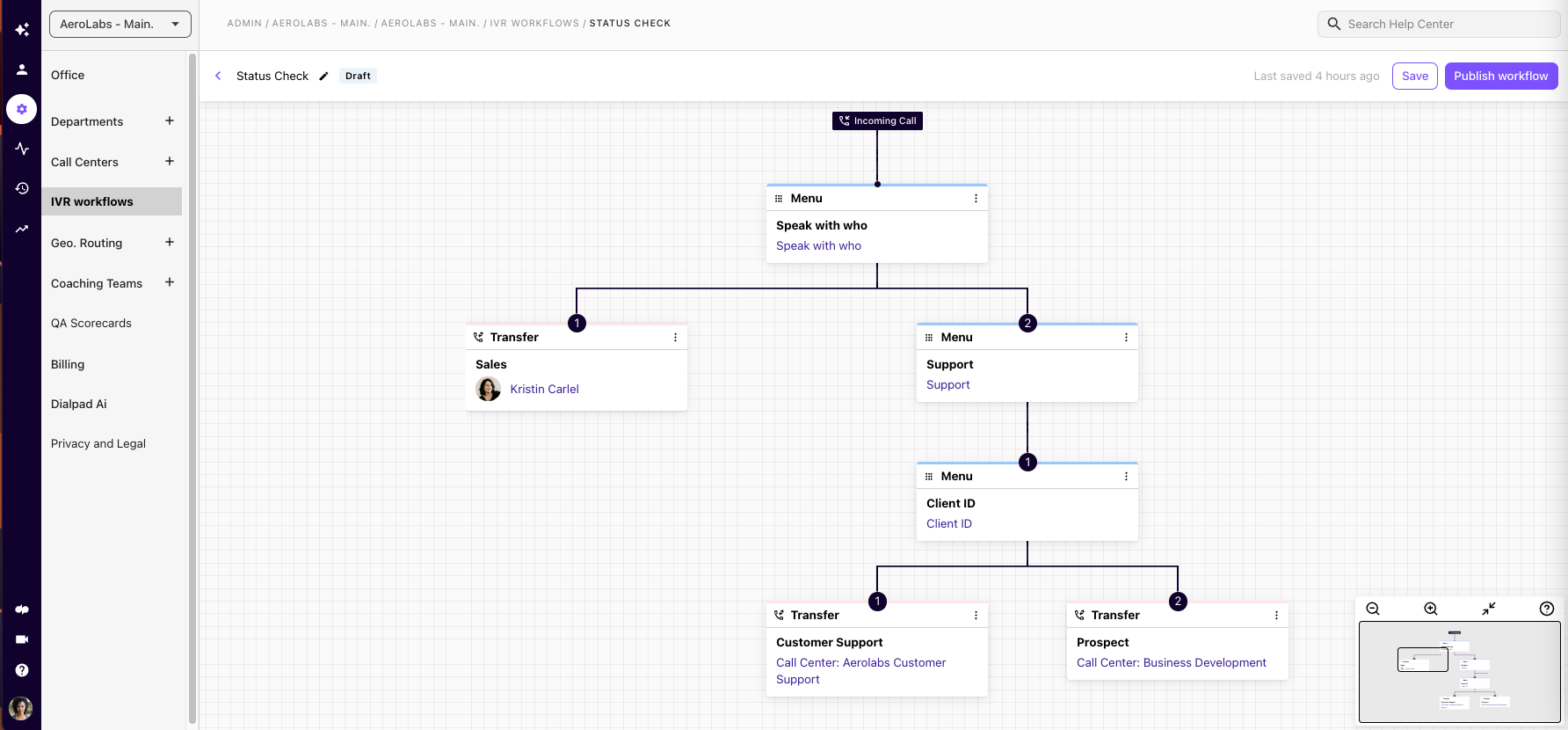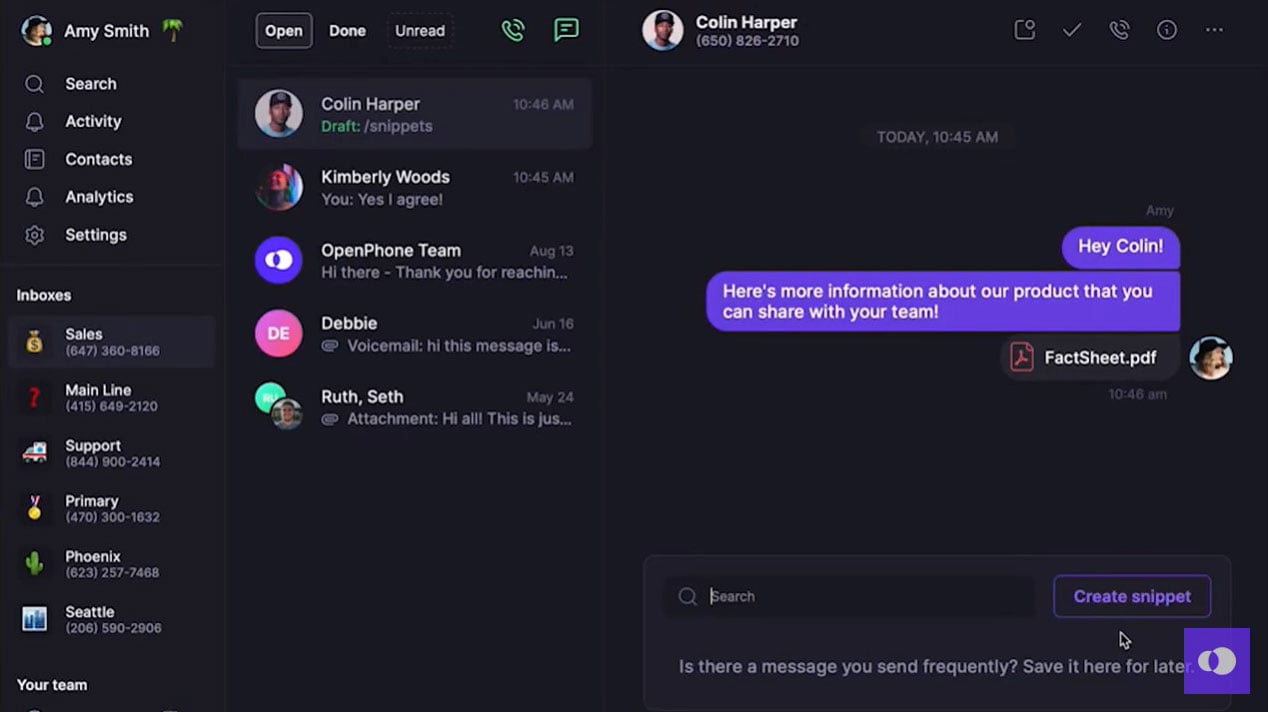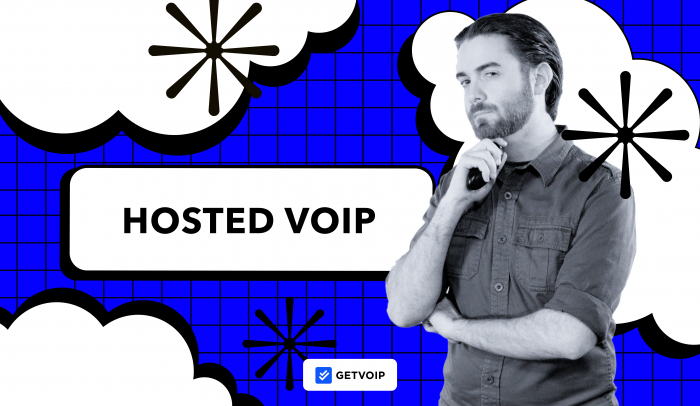Hosted VoIP lets you make phone calls over the internet using a desktop or mobile app. Easily add or remove users and virtual phone numbers, building a scalable and flexible phone system with high-quality audio and advanced features like call routing menus, call queues, and analytics.
This article will discuss everything you need to know about hosted VoIP–including how it works, its benefits, features, and top providers.
- What is Hosted VoIP?
- How it Works
- Hosted vs. On-Premises
- Benefits
- Features
- Use Cases
- How to Choose
- Top Providers
What Is Hosted VoIP?
Hosted VoIP is an internet-based phone service managed by a provider. Unlike self-hosted/on-premise VoIP, which requires all network equipment be housed on the company's premises, hosted VoIP keeps all network equipment at a separate location (or multiple locations) that is maintained and secured by the service provider.
Users subscribe to the VoIP provider’s service, which enables calling and SMS texting through cloud-based software. The provider hosts the software, features, uptime, and global phone network, so the user only needs to download an app and connect to the internet.
Hosted VoIP is typically used by remote teams due to its mobility, startups and SMBs due to its low cost, and even global enterprises due to the high level of security and availability of international phone numbers.
How Does Hosted VoIP Work?
Hosted VoIP uses the internet, rather than landline, to transmit audio data between callers in digital "packets". VoIP calls can be made to and received from other VoIP numbers as well as traditional landlines. VoIP providers manage data centers and servers around the globe, offering this cloud phone service to users via a web and mobile app.
Call Flow
When users place a call through the web or mobile app, their device transmits audio data packets across the web to the recipient and vice-versa, facilitating real-time phone communication. This connection requires each participant to have sufficient bandwidth. When a call is placed to a landline, the data packets are converted back to analog data after internet transmission, and vice-versa.
Using the VoIP App
VoIP users subscribe to a provider’s hosted service by paying a monthly fee. The app provides a business phone system with routing features, queuing, analytics, and more. Users access these features and make calls through the app’s dashboard while administrators manage the phone system through the app, purchase virtual phone numbers, add and remove users, and customize the call distribution system.
Provider Infrastructure
Hosted VoIP providers use multiple global points of presence (POPs), redundancy, and 24/7 network monitoring in order to offer reliable service, often with guaranteed uptime SLAs of 99.999% or more. VoIP providers secure data using features such as two-factor authentication, single sign-on, end-to-end encryption, firewalls, etc.
Hosted VoIP vs On-Premise VoIP
With a hosted phone system, the provider manages the phone system’s hardware, servers, data centers, and VoIP software. With on-premise Voice over IP, the company hosts all their hardware onsite–including PBX servers, SIP trunks, the wires connecting each user, and the software itself.
Here’s a more detailed breakdown comparing hosted vs on-premise VoIP:
| Hosted VoIP | On-Premise VoIP | |
| Where is the hardware hosted? | Provider’s data centers | Business’s office |
| On-premise equipment required |
|
|
| Average cost | $20-30 monthly per user | $20-30 per user, plus over $1000 per year in setup and maintenance fees |
| Typical features |
|
|
| Pros |
|
|
| Best for | Remote teams, those who want advanced features, or those looking to scale | Companies with an in-house IT team that want control over features and data privacy |
Hosted VoIP
- Infrastructure: Hosted VoIP uses third party servers that are housed in multiple secure global locations with 24/7 monitoring for security and reliability purposes
- Management: The provider manages all the hardware equipment–data centers, PBX system, and software–including the programming code, features, and updates
- Service Area: Accessed through an internet-connected device, like a smartphone or computer so that calls and texts can be made from anywhere with stable bandwidth–including on the go or internationally.
- Scalability: Hosted VoIP allows companies to add and remove users based anywhere instantly
- Best for: Hosted VoIP works great for remote and hybrid teams due to its mobility, startups and SMBs due to its affordability, and large enterprises that need advanced analytics
On-Premise VoIP
- Infrastructure: With on-premise VoIP infrastructure, your business hosts all its equipment in the office including the PBX servers, the SIP trunk that connects to the analog PSTN, and the wires running to each user’s computer and VoIP phones
- Management: Still requires a subscription to a VoIP provider for phone service, but the company runs the phone service through its on-site equipment managed by an in house IT team
- Features: Usually only basic features are available such as auto attendants and simple call management like call forwarding and parking
- Scaling: Over time, scaling your company may require more SIP trunks, servers, and wires to accommodate the new users
- Best for: In office teams that already have the physical infrastructure in place
The Benefits of Hosted VoIP
Hosted VoIP is typically cheaper, easier to set up, and more scalable than an on-premise infrastructure. Since hosted VoIP is cloud-based, it supports remote teams and lets users make business calls on the go. Hosted solutions also have more advanced business features and communication channels, improving customer service.
Easy to Set Up and Manage
A cloud-based phone system is entirely app-based, meaning you can configure the phone system and begin making calls in minutes. Getting started is simple–download the app, choose a plan, pay the subscription, and choose a virtual phone number.
Scalability
Adding and removing users is quick and easy with a hosted VoIP system. Managers just add a subscription to the company account, invite the new user via email, and choose a virtual phone number. The new team member can access the cloud-based phone system through the web or mobile app.
This simple process makes it a breeze for teams to expand or downsize, adding new users based anywhere.
Lower Costs
Switching from on-premise to a hosted VoIP system reduces hardware expenses, maintenance costs, and IT staffing needs. With hosted VoIP, you only need to pay for an internet connection and a monthly subscription, ranging from $15 to $30 monthly per user.
This is why 82% of companies report cost savings AFTER transitioning their phone system to the cloud.[*]
Advanced Features
Hosted VoIP phone systems typically include advanced features like IVR menus, ring groups, call queues, call recording, analytics, and AI tools like call transcription.These capabilities provide customer self-service and distribute incoming calls to make your agents more efficient. Tools like AI-powered automations can save some organizations thousands of employee hours each year.[*]

More Communication Channels
Many cloud-hosted phone systems bundle VoIP telephony with SMS texting, team chat, and video conferencing–offering a business communications platform that improves team collaboration and provides more ways to connect with customers.
Even though 76% of customers still prefer to contact companies via the phone, contact centers continue to broaden their feature offerings, resulting in lower costs per assisted contact.[*]

Better Customer Service
With self-service tools like IVR menus, customers can contact your company whenever they want. This increased flexibility is important to customers–especially the younger generation, 87% of whom say convenience is critical to them.[*]
Call queues and ring groups reduce customer wait times, giving you an advantage as 70% of customers consider long waiting times a serious problem.[*]
Security & Reliability of Hosted VoIP
In its infancy, hosted VoIP was not as secure as traditional telephony, but the technology has come such a long way that it is now just as secure if not more secure than the PSTN.
Here is how hosted VoIP providers secure their platforms to prevent costly data breaches:
- Data encryption: Almost every VoIP provider encrypts data in rest and in-transit, with many providers offering end-to-end encryption
- Call security: Calls are secured using features such as single sign-on and two-factor or multi-factor authentication
- Roles and permissions: Admins and supervisors can designate roles and permissions, limiting employee access to sensitive data, call recordings, etc.
- Uptime guarantees: Uptime SLAs ensure that service is reliable and there are no outages during which a data breach could occur
- Disaster recovery options: Disaster recovery is often included with hosted VoIP or offered as an add-on protection for companies if they experience loss due to a natural disaster, power outage, etc.
- Compliance certification: Hosted VoIP providers can obtain compliance certifications when they meet standards such as HIPAA, STIR/SHEKEN, GDPR, etc.
Features of a Hosted VoIP Phone System
Hosted VoIP phone systems generally bundle digital features like virtual dashboards, voicemail, IVR menus, call queueing, analytics, and more. These tools lead to shorter wait times, increased customer convenience, and better agent efficiency.
Here are the features often included with a hosted VoIP solution:
- User dashboard: Desktop and mobile VoIP apps center around a user dashboard, organizing your tasks, communication channels, voicemail, analytics, and call queues
- Virtual voicemail: Voicemail messages include transcription, with voicemail-to-email and voicemail-to-SMS forwarding
- Communication channels: Hosted solutions often bundle VoIP with SMS texting. Unified communications platforms add team chat messaging and video conferencing
- IVR menus: Customize a self-service phone menu that routes callers to the department they want to reach
- Call queues: Call queues organize callers on hold when an agent or department is busy. Staff can view the queue wait list and average waiting time from the dashboard.
- Analytics: The analytics portal tracks and visualizes data and KPIs like call volume, agent activity and performance, and channel usage. Filter these metrics by agent, department, and historical period.
- CRM integrations: Most VoIP phone systems integrate with CRM software like Salesforce or HubSpot. These integrations sync customer data and journey history across platforms for better context.
- Call monitoring: The supervisor portal gives a live view of agent status and queue activity. Managers can jump into live calls to listen or whisper private guidance.
- AI features: Advanced and high-tier VoIP plans include AI features like call transcription and real-time agent assistance
Main Uses of Hosted VoIP
A hosted VoIP system supports most customer communication use cases–including customer support, sales, inbound self-service, automations, and communicating with customers from the field. Small and enterprise-size companies use hosted VoIP to scale flexible and remote workforces while minimizing costs.
Here are some use cases for hosted VoIP:
- Scaling Small Businesses: Hosted VoIP service helps small businesses scale affordably, regardless of industry.
- Startups like Betterment manage to reduce costs while growing a remote workforce, by switching to VoIP as a communications solution.
- Customer Experience: Customer experience is improved with hosted VoIP due to tools such as call queues and self-service IVR menus that lower wait times and make customer service more efficient.
- Direct-to-consumer companies like Phat Scooters benefit from hosted VoIP’s call routing tools, which efficiently distribute inbound callers to your customer service reps.
- Brand Awareness: Hosted VoIP enables team members to make calls from the company phone number on any device and from any location. This builds a more stable brand identity and improves customer communication.
- Companies like Advantage Plumbing use hosted VoIP to communicate with customers from the field, using a consistent business number.
- Process Automation and Sales: Hosted VoIP lets you automate inbound customer service and outbound proactive customer communications via phone and texting. This relieves stress on agents, lowers wait times, and increases efficiency.
- Companies like 24 Hour Tees can generate outbound calling campaign lists or automate SMS texting sequences–based on CRM information and lead data.
How to Choose a Hosted VoIP System?
Use the following process to choose the right hosted VoIP system for your company:
- Determine the features and channels you want
- Compare VoIP providers by features, channels, and pricing
- Check the unlimited calling area, phone number availability, and texting limits
- Use free trials or virtual demos
- Choose the plan with the best value
1. Determine the Features and Channels You Want
Using the features list above as a guide, check out a few providers’ pricing pages to generate a list of your must-have features and channels. Determine which routing tools you want, if you need call queues, and if you need real-time analytics or just basic call logs.
Decide if you want internal team collaboration channels, like chat and video, or if you only need voice and SMS.
2. Compare VoIP Providers by Features and Pricing
Compare five to eight VoIP providers’ phone systems. Visit each service provider’s pricing page and compare the features they offer in each plan. Note which plans provide all your must-have features and channels, and which extra bells and whistles that you would like to have.
Compare each provider’s pricing to get an idea which ones offer the best value for your communication needs. Aim to narrow your search down to three or four potential VoIP providers.
3. Check Calling Area, Phone Number Offerings, SMS Limits
Each VoIP phone system offers a unique calling area, per-user SMS limit, and phone number selection. Anticipating your SMS usage and calling destinations, confirm this information for your top provider choices. You may be able to find hidden value and avoid extra fees.
4. Use Free Trials or Virtual Demos
Many VoIP providers offer free trial periods lasting from 7 to 30 days. And nearly all providers offer in-depth product demos on their website or YouTube. These resources let you test user experience and the interfaces for your top choices.
Try out the dashboard, send SMS texts, make calls, design an IVR menu, and take a look at the analytics portal. Use this hands-on experience to disqualify VoIP systems that your staff find difficult to use.
5. Choose the Plan with the Best Value
Considering your top choices’ features, channels, and user experiences, identify which provider and plan offer the best value. Bottom-tier plans tend to offer a wide variety of communication channels and critical routing features, while mid-tier plans add advanced features like analytics and call queues.
In general, I find that mid-tier plans tend to provide the best value for small companies.
Popular Hosted VoIP Providers
Here are our picks for the top hosted VoIP providers:
| Provider | Pricing (Monthly per User) | Key Features | Communication Channels | Best For |
| Nextiva | $20-$60 |
|
|
Multichannel service and social media management |
| RingCentral | $20-$35 |
|
|
User-friendly phone system |
| Zoom Phone | $15-$22.49 |
|
|
Low-cost phone system |
| GoTo Connect | Quote-based |
|
|
International calling |
| 8x8 | Quote-based |
|
|
Team collaboration |
Hosted VoIP Simplifies Your Phone System
A hosted VoIP phone system is generally cheaper, easier to set up, and simpler to maintain than an on-premise phone system. Cloud-based systems include advanced features, are easily scalable, and support remote teams. Companies of all sizes can easily implement and grow with a hosted VoIP system.
For a closer look, check out our in-depth comparison of business VoIP phone systems.



